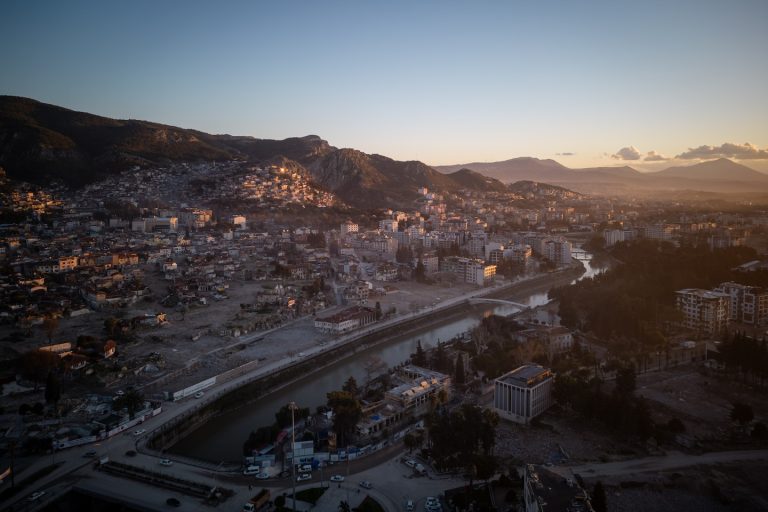It has been a year since a 7.8 magnitude earthquake struck southern Türkiye and northern Syria. It was followed later in the day by another 7.5 magnitude earthquake.
More than 52 thousand people were killed. Hundreds are still missing, and 11 out of 17 provinces in southern Turkey have been declared disaster areas.
At least 4 million buildings were damaged or destroyed. Hatay province was hit hardest.
People pick up remaining scrap metal or valuables to sell, in a place where the economy has also been devastated. Almost all shops, as well as banks, bakeries and restaurants, have been moved into containers spread along the sides of the main roads. Families are also living in tents or containers, without knowing when they might be able to return to their homes.
The search for missing people is still ongoing
In nearby Iskenderun, Sima Gulek said she searches for her son's face in every person she passes on the street. Architect Batuhan, 25, was in his apartment on the night of the quake. “We have a lot of questions in our heads. What happened to him? For almost one year we have been without closure. The days and nights are all the same,” she said.
Gulek is the secretary of the Association for Solidarity with Earthquake Victims and Missing Relatives (DEMAK), which was founded 10 months ago for families who continue to search for their loved ones. At least 145 people were registered with DEMAK as missing in 11 cities affected by the earthquakes. Many of them are missing. The Turkish government does not publish official numbers of missing persons.
Waiting for better shelter
On a recent morning, freezing rain fell on the canvas of Sevkan Türk's tent, located on a plot of land where at least 15 other families reside. Turk, a mother of three teenagers, planted a small garden in front of her tent using discarded yoghurt tubs. “Our psychological situation is just a mess now; With every small earthquake we panic. I saw a lot of dead bodies in the days after the earthquake. There was a lot of looting. We also fear for our safety. “So I started gardening to de-stress a little bit,” Turk said.
She is waiting for a container from the government. On the night of the earthquake, her house at the base of a mountain was damaged by falling rocks. Her mother-in-law narrowly escaped.
Türk expressed growing frustration at the lack of support for those still living in tents. “We didn't get any government help. Only volunteers helped us. We see a lot of fundraising in Antakya, enough to build a whole other city – but we haven't seen any of that help. No cash cards for supermarkets, just a small toiletry kit that arrived A month ago.
Life is more difficult for Syrian refugees
Not far from Turk, another family gathered in their tent to keep warm and out of the rain. The Omar family arrived from Hama, Syria, seven years ago. “Life after the earthquakes has become more difficult,” said Mustafa Al-Omar, who shares a tent with his wife, Sama, and their five children. For Syrian refugees in Turkey displaced by the earthquake, their needs are often secondary to those of Turkish citizens, but Omar's family was trying to remain positive. “There is no better situation than this tent camp. We are not receiving aid, but we hope to get a container soon,” Omar said.
In another camp, where dozens of Syrian families and a few Turkish families reside, toxic sewage was flowing through the corridors. Toilets were few and far between. The landlord, who allowed displaced people to use the land after the earthquake to set up temporary shelter, recently demanded that all families vacate the plot of land.
In a cemetery for earthquake victims on the road leading to Antakya, hundreds of graves lined the hillside. Ahmed Barbour, 20 years old, was visiting his father’s grave with his brother and a friend. Verses from the Qur’an played from his phone as he knelt near the grave, his face solemn. “I come here to visit my father every day,” said Barbour, who is of Syrian origin. “What I miss most about it are the nights my father and I would spend as bookkeepers together in the children’s clothing business, and we would talk and crunch numbers together.” Barbour's grief was palpable even nearly a year later. “Nothing tastes the same after an earthquake.”
In Samandag, a 20-minute drive from Antakya, construction workers repaired slightly damaged buildings while others installed prefabricated structures for homes or shops. Local residents, camped out in tents under a market, were hopeful their city would get the support it needed to recover.
A mountain of rubble grows nearby. Debris from cities and villages is brought here in dump trucks at all hours of the day. Activists and environmental activists protested against the continued dumping of waste, fearing that the rising dust would be toxic.
Thousands of apartments, built by the government-backed housing agency, Toki, are being built in Antakya and other parts of Hatay. Residents do not expect the city to be rebuilt for another decade.
Aladdin Kogal contributed to this report.

